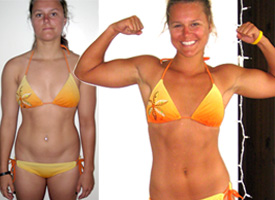Each year, millions of people set out to make this year better than the last. A popular way to do this is through the creation of “resolutions.” Resolutions can be made about any area of life including personal, health, professional and financial matters. Some resolutions are about beginning or developing new habits, and some are about letting go of old ones. An example of a common resolution is quitting smoking.
By far, though, one of the most common new year resolutions are health and fitness related. Losing weight and “getting in shape” are possibly two of the most popular of these.
The month of January will see the highest sales of exercise equipment and gym memberships of any other time of the year. Regular gym goers will often express frustration at how “their gym” has filled up, becoming incredibly crowded during this time, but will quickly mention that it is a short-lived problem, as most of these newcomers will stop coming to the gym before the month ends.
This is because many of these new year resolutions don’t amount to any long-term changes. People start strong in the new year, but fade out quickly, returning to old habits. Why is this? What makes some succeed in their goals while others fail? How can you make this “your year” and reach your goals?
7 New Year’s Resolutions For You To Adopt In 2016
Resolution Solution #1: Get Clear On Your Goals
One of the first mistakes that people make when setting goals for the new year is not being specific enough. “Getting healthy”, “getting fit” and “losing weight” all sound like great goals, but they are vague! What does getting healthy and fit mean to you? How much weight do you want to lose? By when?
A more powerful statement for the new year could be: “I will lose 10 pounds by June 1st.” This is specific, this states your exact intention. Instead of resolving to get healthy, spend some time thinking about what that means to you. Does it mean that you will exercise each day? Does it mean that you will eliminate sugar or processed foods from your diet? Giving yourself specific goals makes it easier to stick to them.
If you have a goal to get fit, healthy and lose weight in the new year, great. One way to really achieve your goals this year is to get specific, then break the goal up into manageable chunks. Don’t overwhelm yourself with one huge goal that you are supposed to follow for the entire year. Set time limits, and give yourself smaller goals. This builds success. Each time you achieve a small goal, or complete something, you will get excited, you will feel pride. This increases motivation, which fuels your success in the next goal. Make this year a series of successes, and by the time the next year rolls around, you will have crushed your goals!
Solution Resolution #2: 30 Workouts In 30 Days
If you want to experience the benefits of exercise, you have to do it consistently. While you don’t have to work out every single day in order to lose weight or get toned, you need to develop the habit, and this means working out every single day for at least 30 days.
The reason: If you are not accustomed to daily exercise, it can take some time to get into the swing of things. If you go to the gym once, and don’t go right back, you are more likely to find excuses to not go. For example, if you tell yourself you are going to go to the gym three times per week, this is what it may look like: “Hmm, okay so I will go Monday, Wednesday and Friday.” So you go Monday, but when Wednesday rolls around you are tired or busy, so you tell yourself that you’ll go Thursday, or maybe just go ahead and go on Friday…you can see where this is going, right?
But, if you simply decide to go every single day, in 30 days you will have developed a habit that you just might stick with for the rest of the year.
Solution Resolution #3: 30 Days With No Alcohol
You want to lose weight and feel healthier? Kickstart this goal with 30 days of no alcohol. Having a drink now and then isn’t necessarily a bad thing, but if you are a regular drinker, the sugar and calories can really add up! Whether you are a beer or wine connesieur, or you like your evening cocktail, you may be surprised at the benefits that cutting alcohol out for 30 days can give you. You will find yourself less bloated, more hydrated, more energetic and slimmer. You might just decide to drop it for good! For now, though, just give it thirty days. If nothing else, it can help you kickstart weight loss.
Solution Resolution #4: Follow A Proven Plan With A Personal Trainer
If you really want to see results, don’t go it alone. You need a roadmap, and you need someone who will help encourage you, keep you accountable and who has the knowledge of fitness, training and nutrition to guide you. People who use the services of a personal trainer will get more out of their workouts, will get feedback that will increase results, and will be more likely to stick with their program. If you want this to be the year you get the body you want, get help!
Solution Resolution #5: Track Your Progress
Set yourself up for success by tracking your fitness and nutrition progress. A great way to do this is through journaling. A fitness/food journal is a great way to do this. You might be surprised to know that journaling is the secret of many well-known, accomplished and successful athletes, both professional and non. Why does journaling work? It helps you see your progress in black and white. It allows you to see what works and what doesn’t. It helps keep you accountable, and it boosts your sense of accomplishment and self-confidence. It shows your progress over time.
A fitness/food journal can be as simple or complex as you want it to be. It can be a notebook that you jot things down in, or it can be an app on your smartphone. Some people track their progress through spreadsheets. Some things you might track: Reps/weight, distance, time spent at the gym, water consumption, weight loss/gain, sleep, etc. Use the same or a separate journal to track food. It will help you to keep track of the amount and quality of your food in a day. You will be surprised at what you learn about your diet by just tracking your food each day! Take it one step further and spend a couple extra minutes tracking mood and energy levels. This doesn’t have to be a page-long diary entry, it can be simple. Doing this can yield a wealth of information about how sleep, exercise and food affect the way you feel, or how the way you feel might impact your workout.
Solution Resolution #6: Don’t Just Diet, Change Your Way Of Eating
Diets are a temporary fix, not a long-term solution. In fact, diets can cause you to gain weight. It’s true. Every year, people set out to lose weight, and have some short-term success, only to end up weighing more than they did when they started the year.
This year, resolve not to diet, but to change the way you eat. It’s not all about calories in, calories out. In other words, just limiting your calories or increasing your activity isn’t going to give you long-term results. You have to look at the quality of the calories you are consuming. Are they coming from low-quality sources, such as sugary, processed foods? Low-quality fats? Or, are you consuming whole grains, healthy fats, real foods and naturally sweet foods?
There is no need to get overwhelmed, making changes to your eating can be done with small, consistent steps and by replacing one commonly eaten food for another. This is where your food journal comes in handy — use it! Start by eliminating the worst foods from your diet: Sodas, overly-processed foods and foods with a high sugar content. Increase your protein intake to help curb hunger and cravings. Find nutritious and tasty substitutions for your favorite snacks — they exist!
Solution Resolution #7: Don’t Give Up!
This is the single biggest mistake that people make when it comes to their New Year’s resolution. They give up. Building healthy habits is a process. Fitness is a journey. You aren’t always going to do it perfectly. Giving up is the only way to fail. If you fall short, if you backslide, if you skip a workout or eat a donut — don’t call it quits. Setbacks are not an excuse to give up.
If you experience a setback, the best thing to do is acknowledge it and move on. This may mean you skipped a week of workouts, or you binged on foods that caused you to feel bloated or put on pounds. Sometimes, results take longer than you thought, and sometimes you hit a plateau. Whatever the case may be, don’t let these things deter you. Just get back up again.
When you give up after a setback, it hurts your confidence and self-esteem, you beat yourself up and feel bad. That only makes things worse. If beating yourself up was an effective strategy, we’d all be in great shape! It does just the opposite, though. You are less likely to try again, and you may even put on more weight. This is why fad diets and poorly planned fitness routines sometimes backfire.
If you want this to be YOUR year, the year you reach your goals to feel and look your best, follow these suggestions. Keep it specific, keep it simple and don’t give up!






